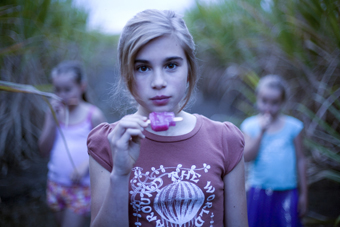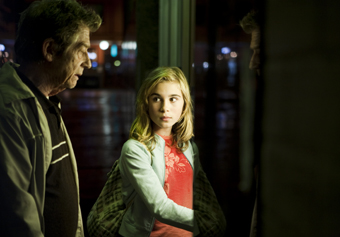coming of age in cane country
kirsten krauth: belinda chayko’s lou

Lily Bell-Tindley, Lou
THERE’S BEEN MUCH CRITICISM OF THE AUSTRALIAN FILM INDUSTRY IN THE PAST FEW YEARS FOR DEALING WITH DEPRESSING ISSUES, PRODUCING KITCHEN-SINK DRAMAS AND BLEAK FAMILY SCENARIOS THAT (APPARENTLY) PEOPLE ARE RELUCTANT TO WATCH. WHILE I DISAGREE WITH THIS ASSESSMENT (I AM DRAWN MORE OFTEN TO THE DARK SIDE THAN THE LIGHT, AND THINK FILMS LIKE BEAUTIFUL KATE OUTRATE I LOVE YOU TOO), IT SEEMS THE FUNDING BODIES ARE MOVING TO ADDRESS IT, SO WHAT WE HAVE INSTEAD SEEMS TO BE A WAVE OF COMING-OF-AGE TALES SET IN RURAL TOWNS, CONTEMPORARY BUT BATHED IN THE GOLDEN LIGHT OF NOSTALGIA, WHERE FAMILIES LIVE IN WEATHERBOARDS WITH VERANDAHS AND CHILDREN YEARN FOR MISSING PARENTS.
I’ve recently seen The Boys are Back (Scott Hicks), The Tree (Julie Bertucelli) and now Lou, written and directed by Belinda Chayko. It seems a shame for the local industry that these themes are so obvious because, while all three films stand alone as decent offerings, seeing them bunched up means there’s a feeling of deja-vu—hey, haven’t I visited this place before?
Belinda Chayko is a Brisbane writer/director who, like Shirley Barrett, has taken 10 years to release her latest feature, after making City Loop in 2000. In the meantime she has worked on TV projects and won an AWGIE for writing Saved (Tony Ayres, 2009), about a young Iranian refugee held in detention and his advocate.
Set in cane country, the film focuses on Lou (Lily Bell-Tindley) who lives with her young single mother Rhia (Emily Barclay) and two sisters. Like Charlotte Gainsbourg’s Dawn in The Tree, Rhia is struggling to keep it together after the father leaves (in this case he just nicks off) and pines for her new lover, as the girls hover and judge. Over the Christmas holidays their lives are disrupted when Rhia’s father-in-law Doyle (John Hurt) is suddenly dumped on the household (Rhia finds she can earn money by letting him stay).

John Hurt, Lily Bell-Tindley, Lou
It’s quite a coup to have Hurt (one of the most outstanding actors working today); his scenes with Bell-Tindley elevate and enliven the story. Bell-Tindley's like a young Abbie Cornish (strong and understated, there’s no cute kid antics here) and she easily holds her own with Hurt. Together—Doyle has Alzheimer’s and sees Lou as his departed wife, Annie—they form a kind of old-fashioned romantic bond that’s subtly directed by Chayko. Barclay, as always, is both tough and fragile. There’s an ordinariness about her that I respond to but she has that ability, like Toni Collette, to transform into anyone.
What I found confusing about the film (and perhaps this is the nature of the disease itself) is the inconsistency in Doyle’s character. He is introduced at the family dinner table as belligerent and angry, swearing profusely and unpredictable. Someone who won’t have a shower, who’s “starting to stink!” At a dinner that Rhia has carefully cooked for her new man, Doyle spits the food over the table: “This is the most disgusting thing I’ve ever eaten!” But we never see him like this again. As his relationship with Lou develops he becomes almost a Hallmark card of sweet good-naturedness, someone that she can trust, a regular grandfather who can take the girls to the beach on the bus (albeit with the occasional bout of jealousy as Lou/Annie becomes interested in a local boy who delivers the paper).
Then suddenly, at the climax of the film, only then, Doyle starts to speak in the spin cycle so familiar to anyone who’s lived with dementia. He begins to repeat phrases—”are we going home by bus?”— until Lou realises her dream of escape has evaporated. It feels like the disease is being worked in around the plot, making false moves. The film is also let down by a few clichéd scenes that seem out of character. When Rhia discovers Lou wearing make-up, she slaps her: “Get that lipstick off your face, you look like a skank.” I’ve encountered this scene in so many films but the extremity of the reaction in this case doesn’t ring true. A number of other scenarios might have worked better. It’s about pausing with the writing and taking a different tack from the predictable one. Also black-and-white is Doyle’s case manager Mrs Marchetti (Daniella Farinacci), an unsympathetic character treating the family with disdain. Surely not all bureaucrats are like this. God help us if they are.
Shot in Murwillumbah, the film looks gorgeous (cinematography by Hugh Miller, who also shot David Caesar’s Prime Mover), as this genre tends to, with the glowing night-sky of burning canefields, the retro interiors, the sensuous dancing of a young girl in a red dress wrapped in golden light. The mood and the rhythm are languorous, conjuring a hot summer holiday, where you drift from one day to the next. It’s a delicate film and I can imagine it will do well on the international film festival circuit. People were raving about it as we came out of the cinema. But I’m looking forward to a new wave of Australian films. I want to be challenged and shocked. I want to be thinking, “God, I’ve never seen anything like this.”
Lou, writer, director, producer Belinda Chayko, producers Tony Ayres, Helen Bowden, Michael McMahon, cinematographer Hugh Miller, editor Denise Haratzis, production designer Pete Baxter. Lou is in limited release around Australia.
RealTime issue #97 June-July 2010 pg. web






